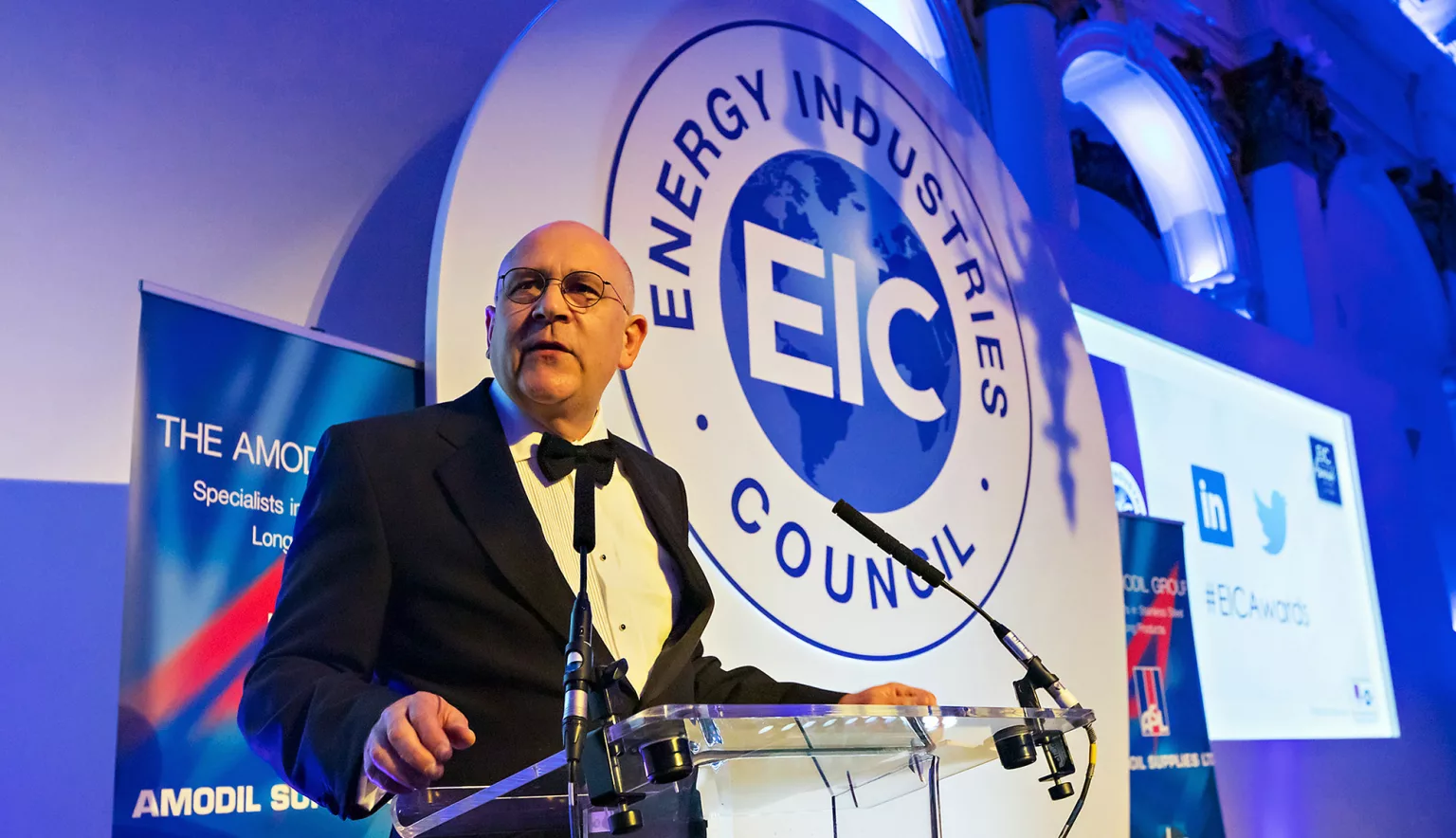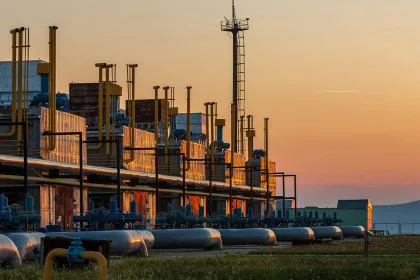Powered by data, purpose and a portfolio of 130 annual events, the Energy Industries Council (EIC) is helping to keep the UK switched on to new, dynamic, energy-centric global opportunities.
ELEVATING ENERGY
Your alarm clock goes off the in the morning. You turn it off before reaching for the light switch, getting out of bed and heading to the kitchen, greeted by a series of warm radiators. Maybe you rummage in the fridge, boil the kettle or use the toaster to make some breakfast, and put the TV on while eating it, before wandering to the bathroom to use an electric toothbrush. You wash away the toothpaste and leave the house, climb in your car, turn on the engine and drive off to work.
It’s easy to take energy for granted – we’re all guilty of doing it on a daily basis. Yet without electricity and fuel, our lives would be profoundly different.
In 2014, humans produced and used 155,481 terawatt hours (the equivalent of 5.60 × 1020 joules) from all sources of energy, a number that has continued to rise year by year. To break it down, we would need to burn 24 billion tonnes of coal in order to provide that much power.
The numbers are truly monumental, unfathomable even. And at the centre of all of this is one of the world’s most lucrative, fascinating industries, comprising everything from oil and gas and renewables to nuclear and electrical power, among numerous other sub-sectors and verticals.
Enter Energy Industries Council (EIC).
A leading not-for-profit energy trade association, it is a crucial player in this mammoth ecosystem, providing dedicated services to over 700 energy supply chain member companies, helping them to understand, identify and pursue relevant global business opportunities spanning each of the aforementioned categories.
“The energy industry is hugely dynamic, which means our role is constantly changing,” explains Stuart Broadley, EIC’s CEO.
“We encompass the whole spectrum, from long established oil and gas entities to promising renewable technology startups and everything in between. That provides us with really unique insight across the entire industry – we’re able to gain a sound understanding of trends and topics because of our privileged position, and try to act as something of a mirror, reflecting back our learnings in order to help businesses and policymakers make better, faster decisions.”
A PASSIONATE BELIEF
Broadley himself is one of few individuals that has a range of expertise across the variety of industry verticals that EIC covers.
By his own admission he somewhat fell into the sector in his mid-twenties, despite having no particular affinity for energy at that time: “I was at a point in my career where I was learning a lot but not earning a lot. It’s why I got involved in energy in all honesty – I had already had four children and it paid well.”
Undeniably, however, this opening turned out to be something of a twist of fate, Broadleyhaving become a leading figure across multiple factions of the energy industry in what has proven itself to be an illustrious career ever since.
“My diverse background is a big reason why I love my current position,” he affirms. “EIC is truly a multi-sector organisation. Upstream, midstream and downstream oil and gas, decommissioning and a multitude of power generation specialisms including renewable and nuclear all fall under its remit.
“Working here is not just a static process of providing the same services to the same companies faced with the same challenges. We are the only entity helping UK energy companies to find a way to grow both domestically and internationally, no matter what niche they specialise in. It’s active, fluid and genuinely exciting.”
Indeed, EIC’s position as a catch-all entity within the UK energy industry is just one of numerous characteristics that set it apart from other trade associations, not-for-profits and business development institutions that may be seen to be delivering the same services to the untrained eye.
The organisation is also uniquely export focused, for example.
“It might sound strange that this is one of our differentiators,” Broadley muses. “I myself found it interesting that we were the only trade association with this outlook when I came on board. I thought why wouldn’t everybody do that? There’s only five percent of the world’s energy production and generation market in northwest Europe, and less than two percent in the UK, so why would you not want to be encouraging companies to export?
“The truth is that exports are perceived as being the toughest strategy for growth in the eyes of energy companies. Exports are perceived as taking too long and being too risky, and these businesses too often choose instead to invest in existing home markets, innovating for existing customers, in order to try to generate typically lower returns than with new export markets, but in months, not years.
“It is our passionate belief, however, that once companies have established themselves in the UK, they need to take advantage of the global market to fully maximise their potential.”
DRIVING FORWARD WITH DATA
This begs the question – how does the organisation go about achieving its goals? How does it help to expand and diversify the capabilities of UK energy organisations in order to broaden their horizons both domestically and overseas?
An ultimately complex question, its answer can be summarised into two broad categories. “First is our focus on data,” the Chief Exec declares.
“It’s a relatively new focus, but one that’s moved us from being purely a business support establishment to an insights-driven organisation, able to provide critical information to customers on any market or sector.”
Here, Broadley is referring to EIC’s three key market intelligence tools – DataStream, AssetMap and SupplyMap.
The former is a leading project tracking database, containing information on energy projects from the inception stage all the way through to completion. Updated daily by expert analysts in London, Kuala Lumpur, Houston, Rio de Janeiro and Dubai, it holds data on over 8,700 active and future CAPEX projects in all energy sectors around the world.
AssetMap, meanwhile, is an operations and maintenance database mapping all major facilities across all energy sectors in the UK, Norway, Brazil, and Gulf of Mexico, ASEAN and GCC states. Likewise, it is a fully interactive tool, updated with daily information about existing facilities and key contracts that enables EIC members to find out who to do business with and contact them.
Thirdly, SupplyMap, the Council’s latest offering, is a verified map of more than 3,500 UK energy sector supply chain companies, able to provide unparalleled insight into the UK’s capabilities and useful in conducting market analysis and research.
“There’s a lot of data here to help industry stakeholders: which customers to target, in which country and which sector, and whether their demands will fit in with the existing offerings of our members,” the CEO adds. “These tools give critical information designed to inspire a much higher chance of short- and long-term success.”
EVENTS WITH RELEVANCE
EIC’s growing nous for data has also helped to enhance its second crucial offering.
Alongside its market intelligence apparatus, it hosts 130 industry leading events all around the world on an annual basis, its data insights being used to create informed agendas that satisfy the interests of its members.
“We have four flagship events within this portfolio,” Broadley reveals.
“The first is the EIC National Awards Dinner, a high-profile conference in London celebrating the successes of UK energy companies. Up until four years ago it was less about the awards and more about networking, but we’ve changed that, and now look to really understand and showcase the inspiring stories of businesses that are doing great things in spite of the tough markets that they face.”
Instead of firms simply applying for awards within the eight available categories, an in-depth interview process now takes place, led by the Council, that facilitates a better understanding of each company’s narrative and progress.
In introducing this, EIC has also been able to develop an impressive series of industry insight reports named Survive and Thrive, that highlights the most popular growth strategies used by companies in tough markets, enhanced with a broader analysis of common pain points and trends that are revealed by these discussions.
“This leads me on to our second flagship event, Energy Exports Conference, which is a direct outcome of Survive and Thrive,” Broadley explains.
“Our realisation that export-led growth was a particularly unpopular growth strategy came from compiling these reports. It was a shock to the government, to us and to other authorities including Oil & Gas UK, Oil & Gas Authority and the Department of International Trade.
“We collectively set out to see if anything tangible could be done to kickstart a greater focus on exports and came up with the idea of launching a brand new, collaborative event that EIC was selected to spearhead as the organising partner.”
Launched last year, the inaugural conference held in Aberdeen welcomed eight inward delegations including ARAMCO, ADNOC and PETRONAS, 350 British supply chain companies and 1,000 attendees over the course of two days.
This year’s edition will look to build on that success, targeting an increased 20 inward delegations that are expected to present $500 billion worth of project opportunities.
“We’ve also been running UK national pavilions at all major energy conferences globally, aligned with the UK government, for more than 20 years,” Broadley adds, eluding to the third of the organisation’s flagships. “These entail eight to 10 exhibitions annually, including one at ADIPEC where in November we had close to 130 UK companies represented across the show, making the UK the third largest country present in terms of representation.
“Meanwhile, the UK is indeed the largest country represented at the US equivalent – Offshore Technology Conference held in Houston.”
Fourthly, EIC runs a series of events named Connect.
A calendar of 12 conferences focused on key energy markets globally, they are formulated from government-to-government relations that links a country’s energy ministry to each event and help to ensure full commitment from all the key stakeholders in each region.
“We regularly host what embassies describe as the largest ever UK inward delegations when we run these Connect events,” the Chief Exec adds. “At the moment, we’re able to bring around 75 British entities to each of the participating countries every year through Connect, with our Indonesia, Mexico and Abu Dhabi editions all having been successfully completed in the past six weeks.”
MAXIMISING THE OPPORTUNITY
Speaking with Broadley, it is clear that EIC takes great pride in enabling innovation, collaboration and progression for the betterment of the energy industry, both in the UK and internationally.
In the past four years alone, the association’s data-based capabilities and events portfolio have been bolstered substantially. Yet the Council is not done here, the CEO instating that his teams will continually strive to deliver enhanced products and services to its member network and help to provide the solid foundations from which emerging trends may flourish.
“The focus for us right now is on the topic of energy transition,” he reveals.
“Let me explain… following the 2014 oil crash, 2015 and 2016 saw an average 30 percent reduction in project and supply chain costs as industry players looked to consolidate their operations. It was actually a very effective two-year period, but it wasn’t sustainable – at some point companies needed to start growing again.
“This came in 2017, when attentions turned to investing in much needed cycles of growth. At that time it looked like it would be from decommissioning, but the more stable oil price and high decommissioning costs delayed expected decommissioning activity, so failed to provide the growth needed by the service sector. 2018 was then the year of data and digital transformation, but again there wasn’t exactly a wave of growth as uptake with new technologies was gradual and risk averse rather than bold and overriding.
“So here we are in 2020, now in the era of energy transition which may well be the opportunity that everyone’s been waiting for from a supply chain point of view.”
Indeed, the subject cannot be ignored. Operators are having to take energy transition seriously owed to growing activism related to the climate emergency, and a desire for diversification away from fossil fuels such as coal and crude oil which currently comprise an alarming portion of global output.
For EIC, however, the primary concern is to ensure that this new phase does not follow in the same unsuccessful footsteps as decommissioning and industry digitalisation.
“We’ve got to be careful that in two years’ time we’re not looking back and once again saying nothing really happened because it was too hard, too risky, or uneconomical for operators,” Broadley comments.
“We’re looking at what energy transition is; what it could be; what technologies and solutions are out there; what policies, legislation and funding models the government may choose as the most effective way of ensuring it happens at the right time, and in the right way.”
Why? Well, in the eyes of the CEO, it’s about more than just preventing any further delay in energy transition. It’s equally about positioning the UK as a leader in the development of energy transition policy and technology, creating local, exportable capabilities for the future.
“I do believe that we’re now in a mini industrial revolution as a result of decarbonisation, and the next five years will be crucial, not only in the way of action and investment but also in regard to making the right decisions,” he states.
“Right now, the UK government is moving in the right direction. Glasgow will be hosting the United Nations Climate Change Conference (COP26) this year, and has pledged a carbon net zero goal for 2050 – a sign that it’s serious about showing global leadership in decarbonisation.
“But we need to move beyond that; to go inside the energy industry and invest so British companies have the support they need to develop new technologies in demanding fields such as a hydrogen, CCUS, offshore wind, energy storage and nuclear small modular reactors.
“Each of these will be carefully looked at, and I believe that if at least two of those are invested in heavily and the UK chooses to become world leaders in the technology development, then we’ll be set for a very exciting decade ahead.”





























